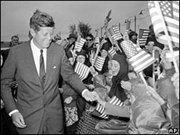 |
| President Kennedy made an emotional visit to his ancestral homeland |
| 1963: Warm welcome for JFK in Ireland |
England have
The US President John F Kennedy has received a rapturous welcome on an emotional visit to his ancestral homeland in County Wexford, Ireland.
On the second day of his four-day trip to Ireland, the president travelled by helicopter this morning to County Wexford.
Hundreds of wellwishers cheered and waved flags on his arrival at Wexford town and a choir of 300 boys greeted him singing "The Boys of Wexford", a ballad about an insurrection in 1798.
The president left his bodyguards to join them in the second chorus, prompting one American photographer to burst into tears.
Once the singing was over, Mr Kennedy shook hands with as many schoolchildren as he could reach.
He was then driven to the nearby port of New Ross from where Patrick Kennedy, his great-grandfather, had set sail for a better life in America back in 1848 during the potato famine.
In a speech at the quayside he said: "When my great-grandfather left here to become a cooper in East Boston he carried nothing with him except two things - a strong religious faith and a strong desire for liberty.
"I am glad to say that all of his grandchildren have valued that inheritance."
'Welcome home, Mr President'
At Dunganstown, five miles (8kms) south of New Ross, President Kennedy visited his ancestral homestead, a small croft building and farm.
The president and two of his sisters who accompanied him on this trip met 15 of their cousins, including the current owner of thehomestead, Mary Ryan who welcomed him with a kiss on the cheek.
Tea had been laid out on trestle tables in the yard and a banner declared "Welcome home, Mr President".
America's first Catholic president spent about an hour chatting with his Irish family, cut a large cake and with teacup in hand said: "I want to drink a cup of tea to all those Kennedys who went and all those Kennedys who stayed."
He was then driven to Wexford town where he made much of Ireland'ssubjugationand religious persecution by the British.
|